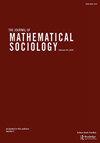Heider balance, prejudices and size effect
IF 1.3
4区 社会学
Q3 MATHEMATICS, INTERDISCIPLINARY APPLICATIONS
引用次数: 8
Abstract
ABSTRACT In a fully connected network of K individuals, links represent symmetric interpersonal relations with their signs – positive for friendly, negative for hostile ones. The network is balanced in the sense of Heider if it is divided into two, internally friendly but mutually hostile groups. A dynamics of the relations has been proposed which leads to balanced states; there, a separate differential equation is designed for each out of K(K-1)/2 links. Here we demonstrate that besides the balanced states, whole families of stable-unbalanced states exist, and the number of these states is limited only by the size of the network. Examples are given for three and four internally friendly, but mutually hostile groups.海德尔平衡、偏见与尺寸效应
摘要在一个由K个人组成的完全连接的网络中,链接代表了与其符号对称的人际关系——积极表示友好,消极表示敌对。如果网络被划分为两个内部友好但相互敌对的群体,那么它在海德尔的意义上是平衡的。已经提出了一种关系的动力学,它导致了平衡状态;在那里,为K(K-1)/2个链路中的每个链路设计单独的微分方程。在这里,我们证明了除了平衡态之外,还存在完整的稳定不平衡态族,并且这些状态的数量仅受网络大小的限制。列举了三个和四个内部友好但相互敌对的团体。
本文章由计算机程序翻译,如有差异,请以英文原文为准。
求助全文
约1分钟内获得全文
求助全文
来源期刊

Journal of Mathematical Sociology
数学-数学跨学科应用
CiteScore
2.90
自引率
10.00%
发文量
5
审稿时长
>12 weeks
期刊介绍:
The goal of the Journal of Mathematical Sociology is to publish models and mathematical techniques that would likely be useful to professional sociologists. The Journal also welcomes papers of mutual interest to social scientists and other social and behavioral scientists, as well as papers by non-social scientists that may encourage fruitful connections between sociology and other disciplines. Reviews of new or developing areas of mathematics and mathematical modeling that may have significant applications in sociology will also be considered.
The Journal of Mathematical Sociology is published in association with the International Network for Social Network Analysis, the Japanese Association for Mathematical Sociology, the Mathematical Sociology Section of the American Sociological Association, and the Methodology Section of the American Sociological Association.
 求助内容:
求助内容: 应助结果提醒方式:
应助结果提醒方式:


